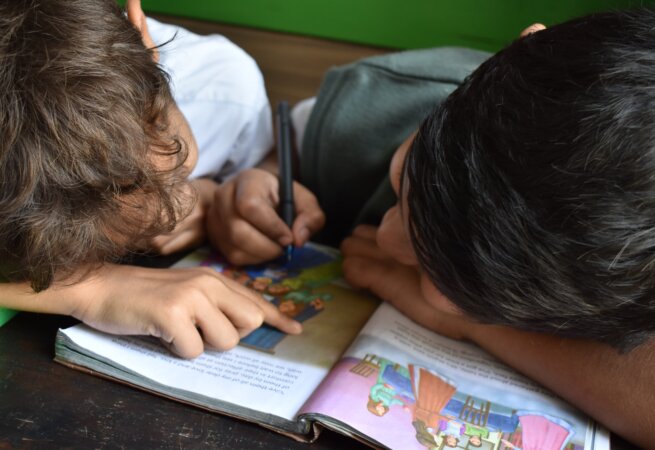“Mom, he says he prays 5 times a day. What does that mean?”
Our middle daughter has made friends with a little boy in her class who also lives down the street from us. She has asked nearly every kid in her class (and all her teachers) if they go to church. But this boy didn’t have an answer for her. He’s quiet and shy, and he tends to keep to himself.
I counseled her to go at it from a different direction. Last December she asked him, “How do you celebrate Christmas?” He didn’t have much of an answer for that either, but he said he believed in Jesus.
Relieved at his answer, she equated this with being a Christian. But after their morning “moment of quiet” at school yesterday (they go to a public school), he leans over to tell her he prays five times a day. She was so blown away at his dedication to God that this became our first topic of dinner conversation.
Stories made in the dark
But I wasn’t the first to answer her—our oldest shouts out, “He’s Muslim!”
Backstory: A group from our church went with iGo Global to a week of missions training, serving, and outreach called LaunchBox. We went to San Antonio, TX where our group visited a mosque and then spent time with Muslim women and children from the community. Our 10 year old went with us, and she was paying attention—I truly had no idea the impact it had on her.
She went on, “They have to wash like half their bodies before they can pray those five times. They believe they have to be physically clean before they pray to their god.”
“And why is that?” I asked.
“Because they think they can be good enough to get to heaven.”
I smiled at her—well done, little one.
What came after this was about 20 minutes of the middle daughter asking questions about how Islam started and what else they believe. This conversation spilled over into our evening walk and then for a while before bed.
The primary aspect of our talk circled and circled around her utter confusion as to why her friend lied to her. Why his parents lied to him. Why all Muslims were lying to each other for all these years.
I left her with two things. First of all, an analogy: “What would happen if I left you out in the field at Granny’s house in the dark with no moon or stars or lights on anywhere? Would you make it to her house?”
“No. I would end up with the cows next door or in that pokey fence.”
“Right. But what if I gave you a flashlight?”
“I’d for sure know where to go!”
“Right. That flashlight is the Bible, and it will surely lead you to God the Father. Your friend has no light because they have stepped out of Truth. He wasn’t lying to you—he was just passing on stories made in the dark, not light.”
She nodded—it was starting to line up for her young, yet spiritually maturing faith. This was a solid step in shaping her Biblical worldview.
The second thing I told her was that we need to pray for his family. She retorted, “No, mama. We need to pray for all Muslims.” I told her they had a holy holiday coming up, Ramadan. She asked if we could pray for them every day of Ramadan—what a great idea.
From a Biblical worldview
Ramadan begins March 11 and ends April 9 this year. This is a time where Muslims reflect, pray together, and read the Quran, practicing self control as they fast from numerous activities, primarily eating, from dawn to dusk. They believe they receive credit from Allah for exercising such restraint.
As Christian parents we have the real time opportunity here to engage in Ramadan with our children, instilling a Biblical worldview in the process.
1. Pray
Oftentimes we want to do more. But prayer is how we humble ourselves before God the Father, admitting we can do nothing on our own. Here are some specific things your family can keep in mind while praying during Ramadan:
Week one: Pray God would give them dreams of who He truly is. Muslims take dreams very seriously, and we know God is over our minds as well.
Week two: Pray that God would build up followers of Jesus during this season. Muslims believe Jesus was real, but they deny His authority and deity.
Week three: Pray for Christians who live in Muslim countries or those who are seeking a life outside of Islam. This is a dangerous season for those who do not celebrate Ramadan but live in a Muslim country. It is always dangerous for those who are pursuing a different faith.
Week four: Pray for your own hearts toward the lost Muslims of the world. There is an estimated 1.9 billion followers of Islam—pray for their eyes to be open to Truth.
2. Teach the Gospel
There are marginal similarities between Christianity and Islam. However, a primary difference is that they reject Jesus had anything life-saving to offer. This is because they reject original sin—if man is not inherently bad then man needs no savior.
It is imperative that our children have a clear picture of the Gospel. It is not behaviorism, nor is it legalism. Yes, we can all fall into measuring our success as parents through how our children behave. And we can often unknowingly reinforce this by only smiling at good deeds and scolding the bad ones, all the while forgetting to remind ourselves and our children of God’s grace, mercy, love, and forgiveness.
We cannot do this on our own, and we need to repeat this daily. We need to model this in our prayers so that our children turn it into their own prayers. There is nothing we can do that will cause God to give us credit toward our judgment that is sure to come in the end.
It is only when we trust in Jesus, repent of our sins, and walk in His commands in total faith that we can experience his grace and eternal life.
3. Have compassion
Jonah couldn’t wait until God would smite the Ninevites because of their disobedience. He sat back to watch God’s judgment rain down on this people group he deemed unworthy of saving. The Psalmist, however, took a different route, “My eyes shed streams of tears, because people do not keep your law” (Psalm 119:136).
Or consider the Apostle Paul—while he was in Jerusalem he got the opportunity to speak to the people, giving his account of his conversion. When he tells of how God is sending him to the Gentiles, they seize him, stretching him out for the whips. The Jews hated the very mention of their name, but Paul, a Jew, was ready for his life to be taken for the sake of the Gentiles receiving the Gospel (Acts 21).
Teach your children to be like Paul and the Psalmist, having compassion on those who are in the dark. This is a natural connection from teaching the Gospel—none of us have the goods. We all need Jesus every day of our lives.
4. Read the Bible
This is how we keep our flashlights brightly on. The only way to have a Biblical view of the world is to know what the Bible says. Seems rudimentary—and it is.
When we visited the mosque we listened to their director of education, Mike, give a breakdown of all that goes on inside. Mike was raised Catholic but converted in the late 90s while a professor at Texas A&M University, so he had much knowledge about the Christian faith. He was very pleasant to learn from, extremely patient with questions from our students. He left us for about 10 minutes so he could pray the Asr, the afternoon prayer, and we experienced it through a one-way mirror over a speaker.
When we got back in the van, the students were stunned. After listening to him they felt the need to dissect the way he presented Islam versus the way we present Christianity—he made them sound complimentary!
I’m not the type to teach that you need to only study the Bible so that when anything counterfeit comes along you can detect it. Rather, it is important to have an understanding of other worldviews, so you can make connections and distinctions.
But I do teach that we test every thought, opinion, fact, view, and understanding there is against God’s Word. It’s the only standard there is.
It makes sense, then, that we should be in a reading plan. It keeps us from leaving out the hard stuff or skipping over what we think we know. Here is one we are trying out from Christ Church in Moscow, Idaho.
We aren’t paying attention to the weekly breakdown as much as just having a guide. Our children are more visual now than we were at their ages, so printing this off is great accountability.
5. Opportunities
As with everything, be intentional and consistent. Listen to your kids when they talk. Listen to their silences as well.
There are buckets of opportunities to engage our children in the culture from a biblical worldview all around us everyday. You can even take your cues from your children and ask what is important to them. How can that be turned into something that teaches what the Bible says about our God, man, and our world?
But for 30 days, keep the Muslims in mind. Building a Biblical worldview of Muslims into your children now will help in not only their own faith journey but also the journey of those who believe differently.
Consider a few extra resources:
- https://www.christianparenting.org/articles/3-ways-to-teach-your-kids-a-biblical-worldview-surrounding-the-war-in-ukraine/
- https://www.christianparenting.org/articles/the-higher-the-walls-the-taller-the-ladders-how-to-teach-a-biblical-worldview-to-your-elementary-aged-kids/
- https://www.christianparenting.org/articles/summer-traditions-teaching-our-children-to-pray-for-the-world/



